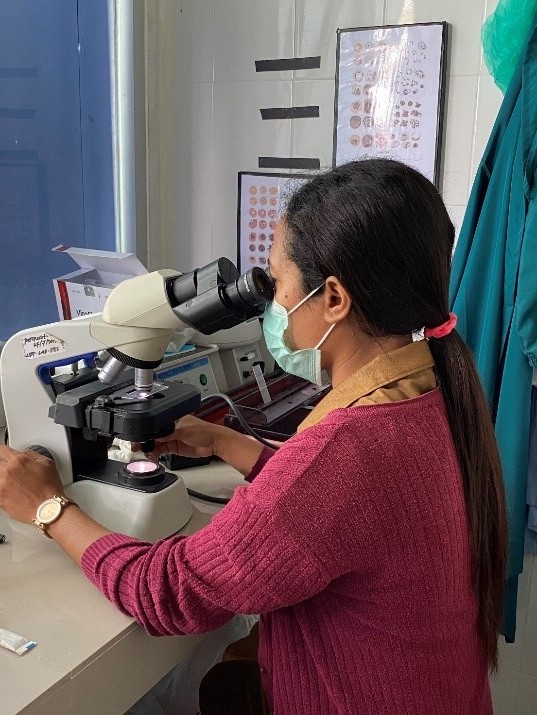Indonesia is one of nine malaria-endemic countries in the South-East Asia region and accounts for 15.6% of the regions reported cases and 22% of malaria deaths. WHO provides ongoing technical support to the Indonesian Ministry of Health by generating evidence, formulating national strategic plans and policies, strengthening case management, and improving surveillance and information systems. Malaria cases in Indonesia decreased from 1.1 million to 659 000 between 2015 and 2019, and it is estimated that 75% of Indonesia's population now live in malaria-free communities. Since November 2018, WHO has provided focused subnational support in nine low-performing districts with moderate to low endemicity. Of these nine districts, two have been declared malaria free by the Ministry of Health, and one district has reported no indigenous cases since January 2019.
Indonesia aims to eliminate malaria by 2030. Due to WHO’s success in its designated provinces, the Ministry of Health requested to expand WHO support to other provinces that have experienced malaria elimination stagnation in the past five years.
How did Indonesia do it, and how did the WHO Secretariat support Indonesia?
- Well-defined elimination strategy adapted to local needs – The WHO Global technical strategy for malaria 2016–2030, updated in 2021, provides a technical framework intended to guide and support regional and country programmes as they work towards malaria control and elimination. In Indonesia, WHO Country Office technical experts support the Ministry of Health to 1) convert WHO global recommendations into locally relevant, evidence-based policy through research conducted in collaboration with local research institutes, universities, and professional organizations; 2) conduct triennial malaria programme reviews that identify critical issues, areas for improvement, and best practice; and 3) develop strategic plans, most recently the 2020-2024 Malaria National Strategic Plan, the 2030 Roadmap for Malaria Elimination, and the Prevention of Re-Introduction Plan.
- Decentralised, coordinated action – Indonesia aims to achieve malaria elimination in phases, and the country’s subnational elimination strategy has been acknowledged by the WHO Global Malaria Programme and incorporated into the WHO framework for malaria elimination guideline. To ensure that efforts are coordinated, different health partners are allocated different districts by the Indonesian government. Since November 2018, WHO has provided subnational technical assistance to nine districts in four provinces of Java Island. In these districts, WHO technical experts adapted workplans, assessed preparedness for and achievements towards malaria elimination indicators, conducted trainings for staff on programme management and malaria information systems, and met with local authorities and private companies to advocate for local commitment and resource mobilization.
- Transforming malaria surveillance as the core intervention of malaria elimination – To strengthen the different dimensions of malaria surveillance, WHO Country Office technical experts 1) developed a system, called Sistem Surveilans Vektor (SILANTOR), that has enabled monthly surveillance of the mosquito vectors of malaria; 2) held workshops to develop a technical manual for monitoring insecticide resistance and trained 21 national entomologists to ensure that protocols moved into practice; 3) provided technical input for the design and development of a national electronic malaria surveillance information system (SISMAL), and trained 786 health professionals from nine provinces, 128 districts and 422 health facilities on its use. SISMAL has been particularly impactful for improving case-finding and reporting, plus strengthening the supply chain through improved stock monitoring.

Photo Credit: © Herdiana/WHO/2021
Photo Caption: Microscopy examination of a suspected malaria case using a blood smear at a health facility. The photograph was taken during a malaria situation assessment conducted by WHO and Indonesia’s National Malaria Control Programme in November 2021.
The COVID-19 pandemic did present a challenge to the continuation of Indonesia’s malaria programme but WHO remained committed to supporting the Ministry of Heath’s response to COVID-19 while maintaining essential health services, including malaria programmes. In one of WHO’s subnational areas of focus, Purworejo, malaria migration surveillance and the COVID-19 response were successfully integrated: Village malaria workers and village leaders collected the travel history for all new visitors to their village and performed screening for malaria and COVID-19 to identify potential infections of either disease.
WHO continues to support the Indonesian government’s malaria programme. From 2021, WHO’s subnational support has been expanded to all provinces in the Java - Bali Region and seven districts in Kalimantan, and in 2022, it will be expanded to 19 districts in Sumatera and Sulawesi.
REFERENCE
[1] Report on the latest situational developments in Indonesia’s malaria control programme (2018). Indonesian Ministry of Health. Situasi Terkini Perkembangan Program Pengendalian Malaria Di Indonesia Tahun 2018. Kementerian Kesehatan https://drive.google.com/file/d/1RTA5DSsvY89dCy6Zz48C--XuwxjCaKAb/view

